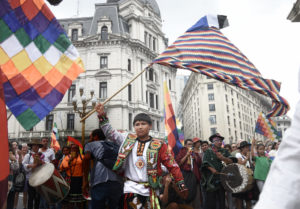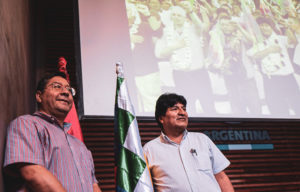
Fireworks exploded across the night sky in the Bolivian capital of La Paz on Sunday evening, October 18th, as the projected results came through showing a near-landslide victory for the left-wing Movimiento al socialismo (MAS) and its presidential candidate, Luis Arce, in the country’s national elections.
After nearly a year of political repression and a government mired in corruption scandals, the message was clear. Democracy had returned to Bolivia, and it was in the hands of the MAS. The election results are a clear repudiation of the revanchist neoliberal project launched by Bolivia’s far-right elites, who sought to recoup power after 14 years of the MAS.
Official results now show the MAS has won 54% of the vote, with closest rival Carlos Mesa from the right-wing Comunidad Ciudadana (CC) party on 29%. In a distant third place is Creemos, the party of far-right Santa Cruz business leader Luis Fernando Camacho. On Wednesday, Camacho’s running mate Marco Pumari found himself pelted with eggs, tomatoes and orange peel when he arrived in his hometown of Potosí; an ignoble end to a perfunctory political career on the national stage.
Except for the conservative strongholds of Santa Cruz, Beni and Tarija, the MAS obtained a majority in all departments. It is clear that the sheer decisiveness of the victory has taken the wind out of opposition efforts to paint the victory as illegitimate. But even so, protests took place in the cities of Cochabamba, Santa Cruz, and Sucre by anti-MAS sectors. In Cochabamba, the violent armed group Resistencia Juvenil Cochala (RJC) spearheaded protests while in Santa Cruz, the extreme-right Pro Santa Cruz Committee issued a statement on Wednesday urging the electoral authority to suspend the vote count, citing fraud.
The elections end the de facto presidency of right-wing evangelical Jeanine Áñez who took power amid a vacuum after ex-president Evo Morales was forced to flee the country last November in a police-military coup, steered from above by the ultra-right civic leader Camacho, who has ties to fascist groups in Santa Cruz. Morales’s resignation in November 2019 was effectively forced when the head of the Bolivian armed forces suggested’ that he resign following a police mutiny in cities across the country. This was the culmination of two weeks of mobilisation by anti-government protestors, largely a right-wing urban middle class movement known as pititas, and more recently, la resistencia, who accused the MAS government of fraud in Bolivia’s October 2019 elections. In this they were assisted by the Organisation of American States (OAS) despite no firm evidence that indicated fraud had taken place. As the Centre for Economic Policy Research (CEPR) thinktank has since argued, the OAS’ statistical analysis was deeply flawed.
At least 36 people were killed in the aftermath of the coup, as the government ordered the military police to fire on anti-coup protesters at the gas plant of Senkata (El Alto), and Sacaba, in the coca growing region of Cochabamba. In November 2019, there was a poignant placard at an anti-coup march in La Paz which captured this injustice: “When the rich march, the police mutiny. When the poor march, they shoot bullets.” Since then, many journalists, MAS officials and trade unions, have been harassed and arrested by the state, in a clear breach of human rights protocol.
So what has changed?
The overt racism of the so-called transitional regime coupled with a woeful handling of the coronavirus pandemic was a major driver in support for the MAS in these elections. Squabbling and disunited, the right-wing parties had precious little to offer beyond demonizing MAS supporters as terrorists and drug traffickers. The de facto government had also been embroiled in numerous corruption scandals, including the alleged multi-million-dollar fraudulent purchase of unsuitable ventilators at the height of the Covid-19 pandemic.
Meanwhile, the resurgence of Bolivia’s powerful social movements placed additional pressure on the neoliberal unelected government. In August, campesinos, indigenous groups, miners and other social movements formed blockades across the country to demand fresh elections beheld after they were twice delayed, ostensibly due to coronavirus.
What’s next for the MAS?

The role of ousted MAS president Evo Morales in this new MAS era is less clear. The charismatic ex-sindicalist and first Indigenous president of Bolivia currently sits in exile in Argentina. However, in an apparent effort to draw a line under previous years, Arce has declared that Evo will not have a role to play in the new government. The crisis of legitimacy in Bolivia’s public institutions combined with a weak press prone to publishing falsified news stories has helped to create a dangerously polarised political terrain.
Certainly, things will not be easy for the soft-spoken Arce. Despite significant economic successes under the MAS, Bolivia remains Latin America’s poorest county, with poverty levels hovering at around 17%. And although the UK-educated economist is credited with steering Bolivia’s steady economic growth when he served twice as Minister of Economy and Public Finance from 2006 to 2017 and in 2019 under President Evo Morales, the days of the country’s commodity boom are well and truly over. The economy looks set to contract sharply due to the impact of Covid-19, and since November last year, unemployment has rocketed from 4% to around 12%. Foreign reserves have dropped, as has income from gas exports to Argentina and Brazil. On top of this, the pandemic continues to play havoc. Over 8000 people out of a population of 11 million have died due to coronavirus. Healthcare provision has improved in recent years but coverage is patchy and often basic.
In the realm of the environment, it is less clear whether Arce and the MAS will attempt to challenge the power of big agribusiness interests, with whom the MAS formed a rapprochement in recent years. Arce has signalled that he will invest in biodiesel, which could lead to further deforestation in the lowland eastern frontier and provoke ire from environmental and Indigenous groups.
Yet despite the challenges ahead, the victory of the MAS this week is a vindication of socialist-communitarian politics and the power of workers, Indigenous groups and campesinos in forging Bolivia’s future. Democracy has returned to Bolivia and it was won by the people.
Olivia Arigho-Stiles is a London-based PhD candidate researching twentieth century Indigenous movements in Bolivia, and a contributing editor of Alborada magazine.
